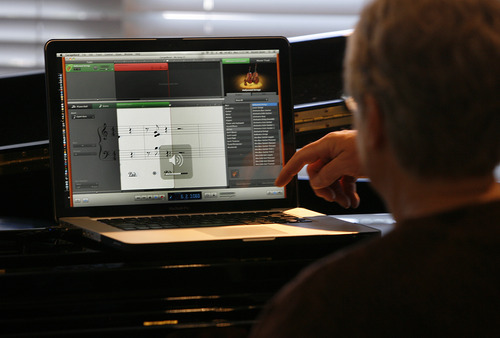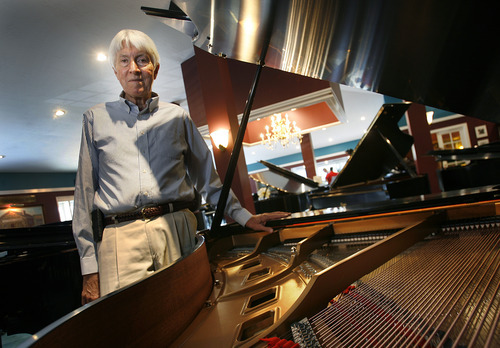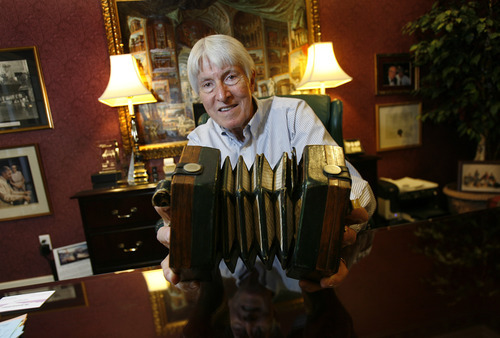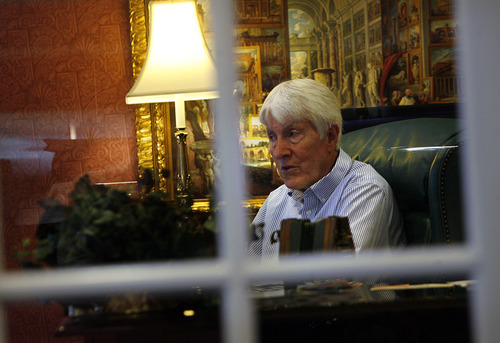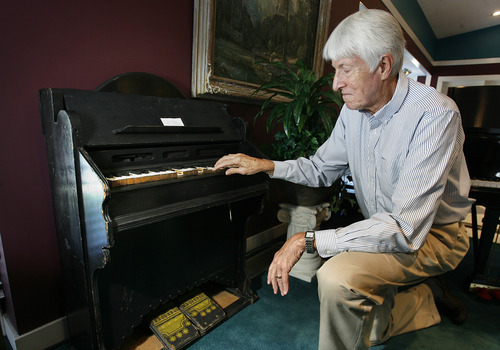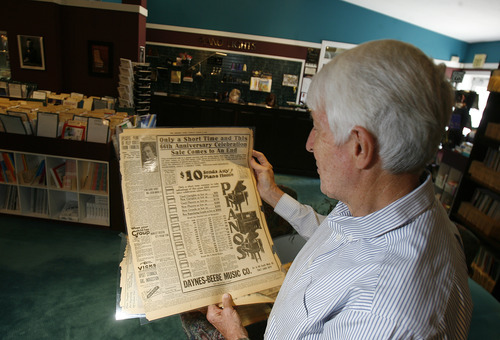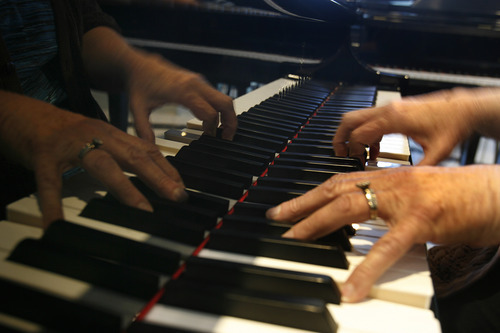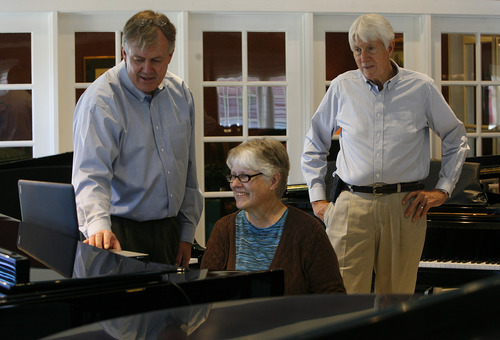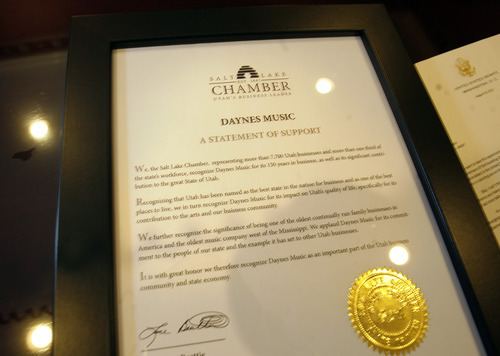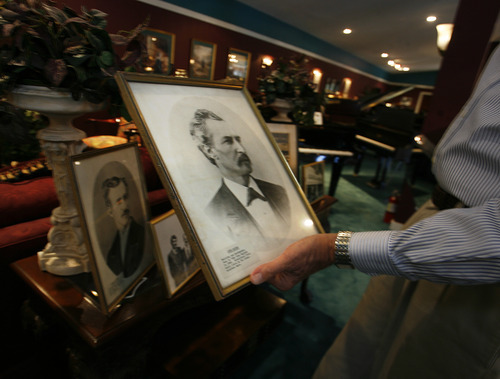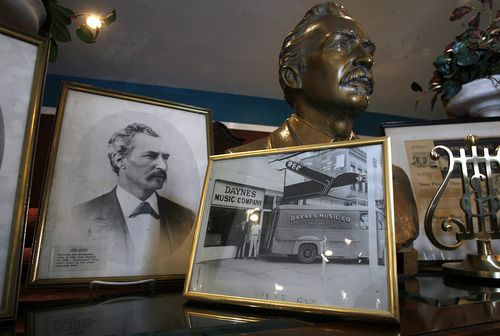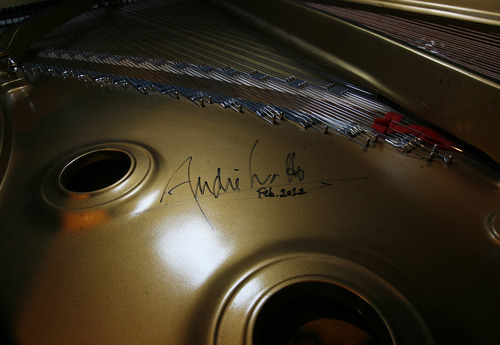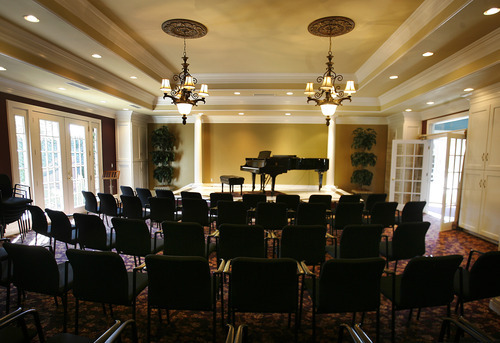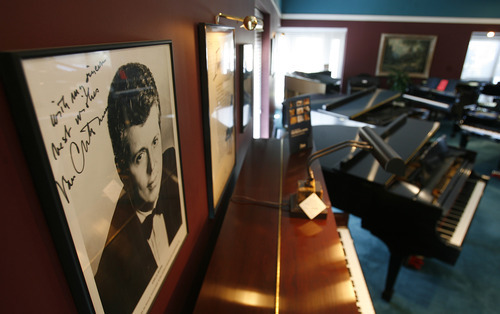This is an archived article that was published on sltrib.com in 2012, and information in the article may be outdated. It is provided only for personal research purposes and may not be reprinted.
Midvale • For the past 150 years, Daynes Music Co. has reinvented itself time and again to accommodate changing tastes and technologies, but one concept has remained the same. What's thought to be Utah's oldest retail store is always looking to put a piano in your home and world-class music in your life.
Today, Daynes also is using the Internet to bring back music education to public schools, where old band and choir rooms have long been replaced by computer labs. And for young students, the music store has a state-of-the-art recital hall with a fully voiced and tuned 9-foot Steinway & Sons concert grand, the choice of most concert pianists.
"They allow kids to play a Steinway grand costing $100,000 — I marveled at their generosity," said South Salt Lake music teacher Clara Neu, who through the years brought her students to the store for recitals.
Since 1873, Daynes has sold Steinway pianos, the first brought to Utah on a ship that sailed from New York City to San Francisco, pre-Panama Canal, and hauled by wagon teams over the Sierra Nevada.
Today's customers may also choose from less-expensive lines at the store's adjacent Discount Piano Warehouse, with an option of trading up to better models, including a handmade Steinway grand, which takes nearly a year to create.
To help students understand the value — and pleasure — of learning to play, Daynes also sells PNOScan (pronounced "piano scan"), an optical sensor that turns a piano into a digital keyboard. Even lessons with only a few notes can be accompanied by an array of computer-generated instruments. The piano's sound can be turned into that of a pipe organ.
One recent afternoon, Neu took a turn at the Steinway to acquaint herself with the device, playing compositions that were accompanied by violins, flutes and a full orchestra, the sounds rising and falling with her own musical technique. The PNOScan is connected by a standard USB cable to a computer, which also translates key strokes into written music so newly minted compositions can be scored and printed.
The piano also can play itself, controlled by a smartphone connected to the system wirelessly. PNOScan's retail for around $2,500.
Lanna Minnick, a Draper teacher who has taught for nearly 50 years, said PNOScan speeds learning and provides students with "instant gratification." Students can see on a computer and hear with the accompanying rhythm the notes they are playing incorrectly, and quickly fix them. One advanced student was ready for a competition in two weeks for what normally takes two months to prepare.
"If the piano industry doesn't grasp the computer, the industry will go away," said Gerald "Skip" Daynes, 73, Daynes Music's fourth-generation store owner.
The Steinway way • He took over the family business in the 1960s at a time when people were purchasing record players and stereos that made music for them, forgoing family traditions of gathering around the parlor piano for evening entertainment. The business was $97,000 in debt.
"There was no one who was my age, everyone was in their 70s," he said of employees and associates. "I decided that I could keep the business running if I could do everything myself, including delivering the pianos."
At the start of this century, Daynes moved the store from its downtown location to the south end of the valley, following the population shift. He also believed in furthering the business and its legacy through the arts. In the 1980s, he made available his store to the newly formed Utah Opera Co. In addition, he devoted floor space to a library of symphony repertory, sheet music, books featuring all major piano methods and, more recently, music education software.
For his efforts, he was honored by the Salt Lake Chamber of Commerce for overseeing one of the nation's oldest music stores. He also takes pride in holding one of Steinway's oldest dealerships outside New York City, where German immigrant Henry Engelhard Steinway started the company in 1853 —less than a decade before Daynes Music's founding.
Daynes Music remains the state's only Steinway dealership.
This past week, concert technician Russell Sorensen was fine-tuning a Steinway for pianist Lang Lang in preparation for a recital this Tuesday in Abravanel Hall. Next to the grand is another Steinway, this one requested by pianist André Watts for a concert last February. His autograph graces the piano's interior plate.
Hard years • Skip Daynes also provides scholarships to young aspiring pianists. And he's convinced that education systems have suffered by reducing or eliminating music programs in public schools.
To that end, Daynes Music developed the computer foundation program for UPlay Piano, an interactive, Web-based instruction series used in after-school programs at three elementaries in Salt Lake City district. The University of Utah is developing the program's content.
Children, many of them from poor homes, learn to play the piano through cartoon characters, stories and games. Early testing shows that students in the program have increased their math and reading skills by up to 50 percent, and are performing one grade level ahead of their peers.
Daynes Music's 150 years of business acumen is spelled out in a handwritten missive that Skip's grandpa, Royal Daynes, once posted on the store wall. It read, "What do we have to do to make a profit?"
Royal Daynes helped fund what would become the Utah Symphony, while aggressively building his music business. At one point he operated 25 stores in Utah, Idaho, Wyoming, Montana and Nevada, before losing nearly everything in the Great Depression.
His son, Gerald, fought to keep the business viable, selling radios, Victrolas and televisions, just about everything relating to music. Hoping the arts would further his business, he opened his downtown store in the 1960s to the Utah Civic Ballet, now known as Ballet West. The top floor and basement of the store, then at 156 S. Main, were used for rehearsals, and the main floor served as the ticket office.
But those hard years convinced Gerald Daynes that none of his children should enter the challenging business. That resolve included his eldest, Skip, who was working in the Snyderville Basin about 15 miles east of Salt Lake City on a cattle spread owned by his uncle, Thomas Jeremy, known today as the Jeremy Ranch community.
Skip Daynes was a cowboy and a University of Utah graduate in business management when he decided to disregard his father's wishes and do what he could to save his family's music business, partly from pride that Daynes Music was among the nation's oldest family owned stores.
Beautiful music • The business had gotten its start in 1862 as a jewelry and music store in a log building just east of Main Street on 100 South — the first of what would be 15 locations in Salt Lake City. Its founder was British watchmaker and Mormon convert John Daynes, whose hobby was music. While crossing the plains to the Salt Lake Valley, his 11-year-old son, Joseph, played a small accordion or concertina during the long marches. At night, the boy played a harmonium, a smaller version of a pump organ, while the Saints sang hymns around the campfires.
It was during welcoming festivities for the pioneers, near where City Hall now stands, that Mormon colonizer Brigham Young first heard the boy play the harmonium and reportedly exclaimed, "There is our organist for the Tabernacle organ."
Young sent Joseph Daynes to New York City for training while construction continued on the Tabernacle and its great pipe organ. At age 16, the young man played for the first church conference in October 1867. He would be organist for The Church of Jesus Christ of Latter-day Saints for the next 33 years.
One of Joseph Dayne's compositions, "As the Dew From Heaven Distilling," is the theme melody played at the end of the Tabernacle Choir broadcast each Sunday.
On display at Daynes Music is the old harmonium, with a leather-strap groove its founder used to carry the instrument on his back over dangerously steep inclines during the trek west.
The concertina sits atop Skip Daynes' desk.
The story has it that Joseph Dayne's music provided so much comfort on the Mormon Trail that the pioneers took turns making room for the boy in their wagons, sparing him from walking.
With that family memory, Skip Daynes cringes when he sees teens wearing headphones listening to music, "when they could be making beautiful music themselves." —
Daynes Music Co./Discount Piano Warehouse
Where • 6935 S. State St., Midvale
Hours • 10 a.m to 6 p.m., Monday through Saturday
Selling • Pianos, player-piano systems, sheet music, accessories such as metronomes, lamps, benches
Founded •1862 in a log building just east of Main Street on 100 South in downtown Salt Lake City
Symphony patron• In 1902, company president Royal Daynes helps fund the forerunner of today's Utah Symphony
Ballet booster • In 1963, then-owner Gerald Daynes opens store to be the first home of what became Ballet West
Opera fan • In 1982, Gerald's son, Skip Daynes, uses store to house offices of the Utah Opera —
Oldest continuously operating Utah firms
1862 • Daynes Music, Midvale
1873 • Zions Bank, Salt Lake City
1880 • Winder Farms, West Valley City
1886 •Lagoon park, Farmington
1892 • Sweet Candy Co., Salt Lake City
1896 • S.E. Needham Jewelry, Logan
1905 • Utah Woolen Mills, Salt Lake City
Source: Tribune research


